Catholic Afterlives: What Identities and Practices Persist When Catholics Leave the Church?
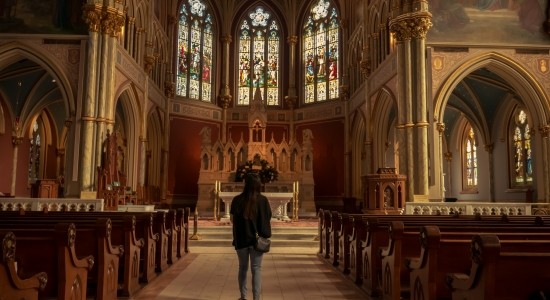
Abstract
A documentary by renowned German filmmaker Wim Wenders, Pope Francis: A Man of His Word offers a candid and unconventional look at the Catholic pope, who has captivated the world, and continues to invigorate the role and vision of the modern Catholic church. The film offers the opportunity to hear Francis discuss his papacy in his own words, in an intimate format: if the viewer suspends disbelief for even a moment, it is as though he or she were sitting in the same room as the pope. The Boisi Center is proud to offer a screening of this compelling documentary, with a panel discussion to follow.
Speaker Bio
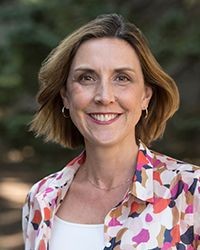
Mara Willard is an assistant professor of religious studies at the University of Oklahoma, where she also is affiliated with Jewish Studies and Women's and Gender Studies. A board-appointed member of the American Academy of Religion's Committee on the Public Understanding of Religion, her research focuses on the intersection of religion, ethics, and politics in the twentieth century. Her first book, Politics after the Death of God (currently under review by Oxford University Press), presents a fresh reading of Hannah Arendt, demonstrating that Arendt's diagnoses and proposed cures for modern state violence made creative use of intra-and post-Christian theological debates.
While at Boston College, Willard will also advance her research on the so-called "Crisis in the Church" of 2002. This book project considers how lay and clerical initiatives for ecclesial reform in response to the clergy sex abuse scandal were conditioned by Catholic practices and priorities as well as class and cultural shifts of post-war Catholicism.
Willard received a B.A. with distinction from Swarthmore College, holds an M.Div. from Harvard Divinity School and Ph.D. from Harvard Graduate School of Arts and Sciences. She grew up in Newton, Massachusetts, and has vivid childhood memories of sitting in traffic on Boston College game days. She is living for the year in the town of Arlington, with her spouse Chris Railey and their two boys, ages 9 and 6.
Event Photos
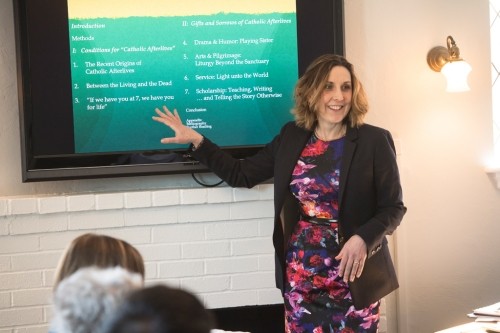
Mara Willard, assistant professor of religious studies at the University of Oklahoma, presented her research on the cultural identities, preferences, and affiliations of those who no longer claim a relationship to the Roman Catholic Church.
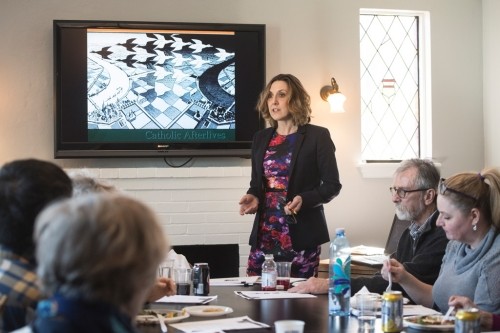
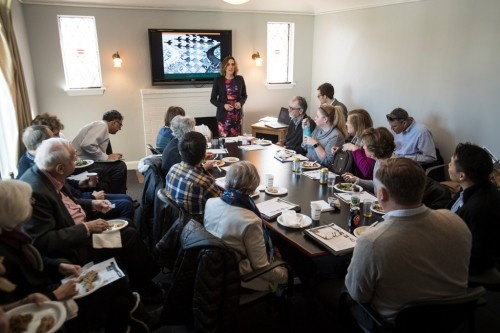
Photos by MTS Photography
Event Recap
Mara Willard, assistant professor of religious studies at the University of Oklahoma, delivered a luncheon colloquium at the Boisi Center on the topic of “Catholic Afterlives.” Dr. Willard is currently a Visiting Scholar at the Boisi Center, where she has been advancing her research on the so-called “Crisis in the Church” of 2002. The latter is a book project that considers how initiatives for ecclesial reform in response to the clergy sex abuse scandal were conditioned by the practices and cultural shifts of post-war Catholicism. Her March 23 lecture, which served as a forum for scholars to deliberate the paradigmatic prospects and challenges of her scholarly enterprise, addressed one principal query: What cultural identities, social affiliations, and aesthetic preferences persist among Catholics who leave the Church?
Willard began by foregrounding the theological origins of her study as well as defining terminologies related to her project. One such origin is the outdated framework in the study of religion. Sociologists and anthropologists have customarily evaluated the growing body of Catholics that no longer claim a connection to the Roman Catholic Church through a lens of “institutional loss.” This understanding, Willard stressed, neglects post-affiliative roles (e.g., “alumni” and “veteran”) and effaces “Catholic afterlives.” Another origin is the post-Vatican II biblical encyclicals on birth control. However, Dr. Willard dates her personal interest to the outbreak of the Boston clerical sex abuse crisis of 2012.
Dr. Willard then outlined her research methodologies for her book project on “Catholic afterlives.” She intends to explore not just the reasons for disaffiliation, but also what she calls “gifts and sorrows of Catholic afterlives.” These include pilgrimage, the arts, community service, and academic scholarship––all practices and identities of those who had been formed as Catholics. Exploring Catholic “after-lifers,” however, is made difficult because “external typologies can conflict with “self-ascription” of “after-lifer” status. More broadly, Willard discerns a “new anti-Catholicism” (see: Ron Duthat and George Weigel), as well as an “intra-Catholic agonism” (see: Bruce Springsteen).
During the question-and-answer session, participants raised some issues for Dr. Willard to consider in her book project. Some referred to the “stickiness” of the Catholic faith. Others highlighted that departure from the Catholic faith does not necessarily indicate hostility, but could also reflect a lack of spiritual nourishment. Others urged Dr. Willard to consider the behavior of “after-lifers” as transformed versus persistently Catholic activities, while yet others stressed the salience of gender, class and sexuality as confounding variables for after-lifer aesthetics.
Read More
Books
Byrne, Julie. The Other Catholics: Remaking America’s Largest Religion. Columbia University Press, 2016.
Chappel, James. Catholic Modern: The Challenge of Totalitarianism and the Remaking of the Church. Harvard University Press, 2018.
O’Connor, Thomas. Boston Catholics: A History of the Church and Its People. Northeastern University Press, 2000.
O'Toole, James. The Faithful: A History of Catholics in America. Harvard University Press, 2008.
Portmann, John A. Catholic Culture in the U.S.A.: In and Out of Church. New York: Continuum, 2010.
Seitz, John C. No Closure: Catholic Practice and Boston’s Parish Shutdown. Harvard University Press, 2010.
Articles
Eyre, Brian. “Priests Who Marry: Defection or New Direction?” Association of Catholic Priests. April 20, 2016, https://www.associationofcatholicpriests.ie/2016/04/priests-who-marry-defection-or-new-direction/
Harris, Elise. “What Does it Mean for a Priest to be Laicized?” Crux Catholic Media. March 16, 2017, https://cruxnow.com/interviews/2017/03/16/actually-mean-priest-laicized/
Hartley, Kevin. "The Priest Who Turned His Back on the Church – For Love.” The Independent. January 4, 2018, https://ind.pn/2nbnxzu
Slick, Matt. "Testimonies from ex-Roman Catholic Priests.” Christian Apologetic and Research Ministry. 2017, https://carm.org/testimonies-ex-roman-catholic-priests
Stamm, Martin J. "The Laicization of Corporate Governance of Twentieth Century American Catholic Higher Education." Records of the American Catholic Historical Society of Philadelphia 94, no. 1 (1983): 81-99.
Willard, Mara. "Interrogating A Mercy: Faith, Fiction, and the Postsecular." Christianity & Literature 63, no. 4 (2014): 467-487.
Other Resources
Crawford, Sue E.S. Clergy at Work in the Secular City. Ph.D. dissertation. Indiana University, 1995.
"On Catholic Culture." A blog for U.S. Catholic Magazine by Stephen Shneck, http://www.uscatholic.org/blog/201506/catholic-culture-30152
In the News
In a 2017 interview with Crux Catholic Media, Father Damián Astigueta, Professor of Canon Law at the Pontifical Gregorian University, provided insight on one population of Catholics who leave the church: "laicization,” or the removal of priests from clerical duties. He described the grounds for dismissal from the clerical state, as well as recent modifications to such criteria under Pope Francis.

